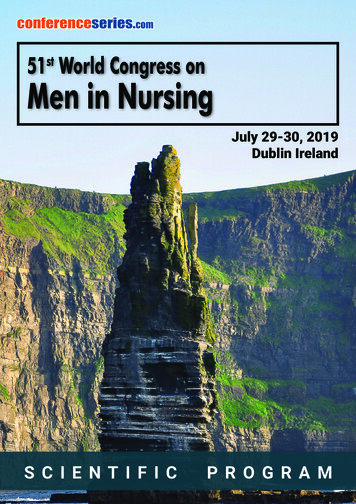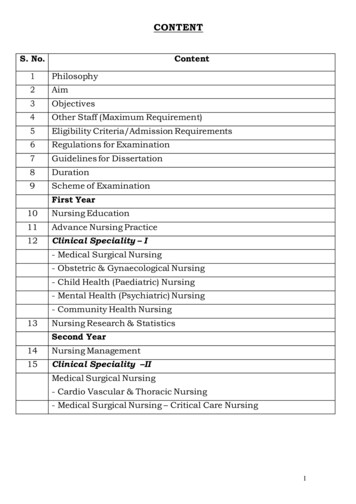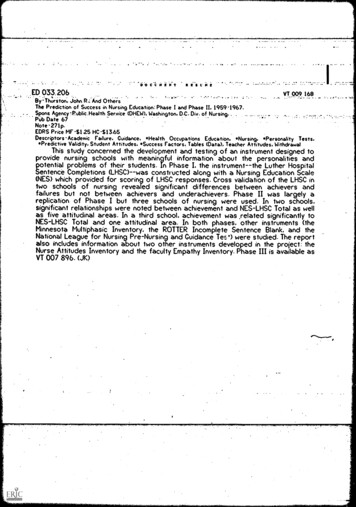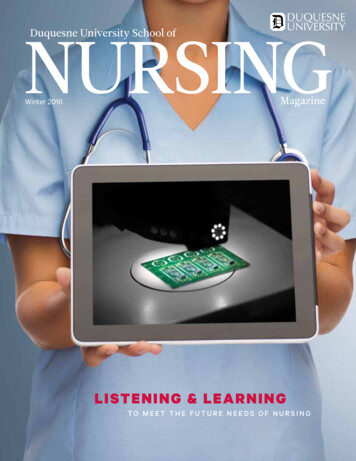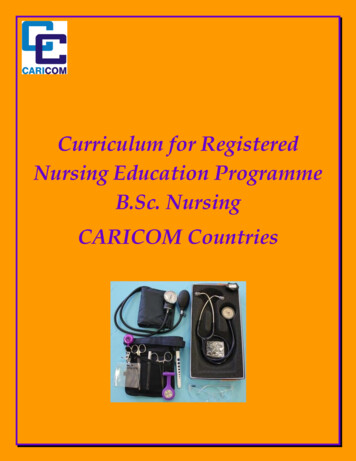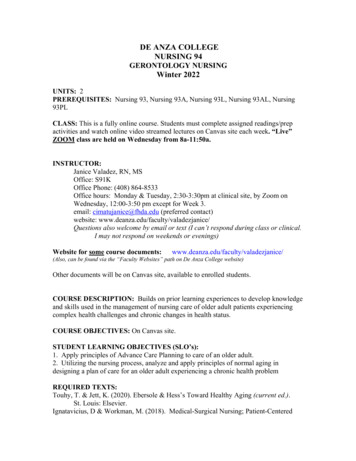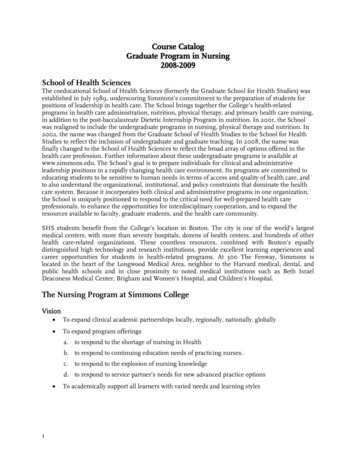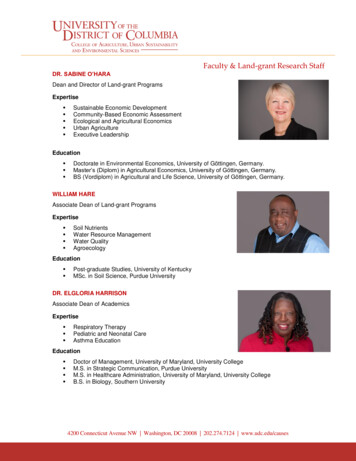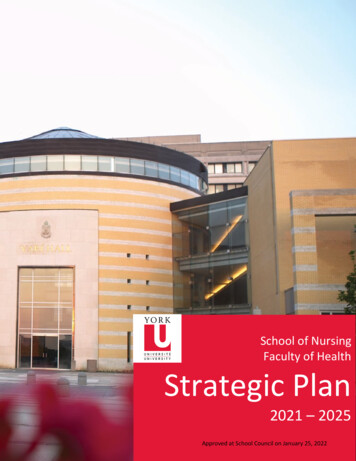
Transcription
School of NursingFaculty of HealthStrategic Plan2021 – 20251Approved at School Council on January 25, 2022
Table of ContentsSchool of Nursing Strategic Plan . 3Introduction .3Philosophy Statement .4The Priorities . 41.21st Century Learning: Diversifying Whom, What, and How We Teach .52.Knowledge for the Future: From Creation to Application.73.From Access to Success: Attaining Successful Program Outcomes .74.Living Well Together: Excellence Through Engagement and Collaboration .85.Working in Partnership .96.Advancing Global Engagement .102Approved at School Council on January 25, 2022
School of Nursing Strategic PlanIntroductionThe School of Nursing’s (“School”) 2021-2025 strategic plan reflects York University’s motto,Tentanda Via – the way must be tried, the School’s 25-year history (1993-2018), and evolvingroles of nursing in Ontario, Canada, and globally. The strategic plan serves to create a bold newway to maintain the highest standards of academic excellence in teaching, learning andresearch across all School programs (undergraduate and graduate) and School activities. It aimsto ensure the curriculum, programs, processes, structures, and outcomes maintain Universityacademic benchmarks and professional requirements set forth by provincial, regulatory andnational accreditation bodies.The COVID-19 pandemic illustrates the constantly changing and dynamic nature ofteaching/learning and practice environments and the transforming roles of nurses. The School’srenewed vision, mission, and philosophy (September 2020) represents our commitment toeducate nurses for the dynamic changing 21st century healthcare system. As such, this strategicplan is a ‘living document’ to identify new ‘ways of thinking’ and ‘practicing’. The way in whichthis strategic plan is implemented, including any policies, programs, operations and practices,will reflect our core values and the spirit of fairness, equity, diversity, and inclusion.VISIONHealth for all through nursing excellence.MISSIONThrough the promotion of excellence innursing education, research, policy andpractice, we foster the development ofreflective and socially responsive futureleaders in the profession of nursing.Core Values ExcellenceRespect and Relational PracticeTransformation and LeadershipEngagement and CollaborationDiversity, Equity, Inclusion and SocialJustice3Approved at School Council on January 25, 2022
Philosophy StatementWe are committed to nursing as a profession th at provides leadership in the pursuit of healthfor all and excellence in health care. We recognize there are multiple social, ecological, politicaland economic forces influencing health and health care. We also recognize that nursingknowledge and expertise are needed to investigate the conditions that support, and critiquethose that constrain, the quality of health and health care. As a profession, we are committedto sharing this knowledge to optimize safe health and healing practices, and promote accessibleand inclusive healthcare, as we strive with others to forge a strong and healthy future. As arelational and evidence-informed profession, nursing is grounded in ethical practices, empathy,reflection, and critical inquiry. We are committed to the tenets of equity, integrity, and intraand interprofessional collaboration in our pursuit of life-long scholarship and research thatcrosses cultural and disciplinary boundaries. Nurses play a pivotal role in partnerships andadvocacy to achieve health for individuals, families, communities and populations, with a focuson sustainable development and social justice now and in the future. Within the School ofNursing, we strive to foster rich experiential learning environments and utilize transformativeteaching strategies to support our undergraduate, graduate, and postgraduate students andfaculty members. Graduates from our programs become practice and health system leaders,change agents, policy-makers, educators and nurse scientists and join others in advocating forhealth as a human right.The PrioritiesThe School’s strategic plan outlines six intersecting priority areas which are paramount toestablishing the highest standards of academic excellence in teaching, learning and research,and for continued growth for the next few years. Aligned with York University’s UniversityAcademic Plan (UAP) 2020-2025, 1 the School’s strategic plan furthers calls to action for faculty,students, and staff to contribute to the United Nation’s Sustainable Development Goals (SDGs)which comprise of 17 interconnected global goals to “achieve a better and more sustainablefuture for all” 2 and to intensify our efforts to address systemic racism (Black, brown,Indigenous) in nursing education, nursing practice, and the healthcare system. To achieve ourpriorities, an integrated resource plan will also be created with action/strategies,measures/metrics/milestones, timelines and responsibilities that will be used to regularlyevaluate our progress. In order to achieve our priorities and pivot appropriately whennecessary depending on social, cultural and political milieu, this integrated resource plan willemphasize clear processes, structures, and outcomes. In this way, University academicbenchmarks, and professional requirements set forth by provincial, regulatory and nationalaccreditation bodies will be met and surpassed.1York University New Academic Plan for 2020-2025. Accessed Feb 28, 2021 from a-BetterFuture-YorkU-UAP-2020-2025.pdf2 United Nations Sustainable Development Goals Accessed Feb 28, 2021 from bledevelopment-goals/4Approved at School Council on January 25, 2022
1. 21st Century Learning: Diversifying Whom, What, and How We TeachThe School has a history of delivering Bachelor of Science in Nursing (BScN) programs – 4-yearCollaborative BScN, 2-year 2nd Entry BScN, 20 months BScN for Internationally Educated Nurses– and gradiate programs – Master of Science in Nursing (MScN) and Primary Health Care NursePractitioner (PHCNP) programs. In the Fall of 2018, we admitted our first cohort of students toour new doctoral (PhD) program.Several external factors have driven changes to nursing education in our School and willcontinue to have an impact on our programs, our students, and all faculty.In October 2018, the College of Nurses of Ontario (CNO) officially launched a new, requiredprogram approval process. 3 Our undergraduate programs underwent a comprehensive reviewand were approved in 2021. Our MScN-PHCNP program was approved December 2018. ThisCNO approval process includes a comprehensive review every seven years and an annualreview of specific outcome indicators (e.g., pass rates on regulatory exam). Over the past fewyears the MScN-PHCNP program has achieved 100% pass rates in the CNO regulatory exam.In 2020, the Ontario government permitted Colleges to offer a standalone BScN degreeprompting an amicable agreement to dissolve the collaborative partnership with Seneca andGeorgian Colleges. The Fall of 2021 will mark the final admission of students into the 4-yearCollaborative BScN program and the introduction of 4-Year Direct Entry BScN Program with allfour years on York campus.The Canadian Council of Registered Nurses Regulators’ cyclical review (every five years) of theentry-to-practice competencies has led to changes in the entry-to-practice competencies. Now,the various roles that nurses assume in the provision of safe care, and in the context of changesin health care environments emphasizes knowledge of continuous quality improvement, andrecommendations from the Truth and Reconciliation Commission of Canada: Calls to Action.Consequently, new Registered Nurse (RN) entry-to-practice competencies were launched byCNO in September 2020. All our undergraduate programs have undergone major modificationsto respond to requirements of these new national entry-level competencies.At its inception, the MScN program integrated human science and relational principles withtheoretical knowledge on transformational and organization leadership, caring and narrativepedagogies, global and local health policies and human health experiences. While the core ofthis comprehensive perspective remains, the program has broadened beyond specifying HumanScience as the philosophical/theoretical core of the program; instead recognizing it as one ofmany, relevant perspectives.3Program Approval Official Launch October 2018 PowerPoint Accessed February 28, 2021 from -2018.pdf5Approved at School Council on January 25, 2022
On May 14, 2021 the Ontario government announced an investment of 35 million to enablecolleges and universities in the province to increase enrolment in nursing programs as theCOVID-19 pandemic has exacerbated the existing shortage of nurses across the healthcaresystem. The School increased intakes in the undergraduate programs and maintained an intakeof part-time students into the MScN – PHCNP program to respond to the health humanresource crisis.This priority examines what is essential to attracting students to our School, equipping themwith the competencies (knowledge, skills, and attitudes) for currency of practice to promotehealth for all through nursing excellence, and how we teach them to be reflective and sociallyresponsive future leaders in the profession of nursing.York University’s School of Nursing will introduce a suite of distinctiveundergraduate nursing programs that will be a source of pride for the schooland create a comparative advantage that differentiates York University’sSchool of Nursing from other universities and colleges.York University’s School of Nursing will update its programs to addressemerging nursing issues and labour market needs, to build essential 21stcentury nursing skills for graduates to practice in and serve, a broad range ofcommunities anywhere in the country and address global health and socialchallenges of the 21st century.York University’s School of Nursing will have governance structures andprocesses that ensures cohesive and consistent delivery of an effective andrelevant curriculum, in compliance with CNO approval and accreditationstandards.York University’s School of Nursing will renew the physical environment andeducational resources in the nursing simulation centre to deliver andundertake research to advance experiential, interactive, and interdisciplinarylearning.York University’s School of Nursing will attract talented students to meet orexceed (e.g., with international students) enrolment targets and produce thebest graduates.6Approved at School Council on January 25, 2022
2. Knowledge for the Future: From Creation to ApplicationImproving the quality of our undergraduate and graduate programs and commitment toexcellence in teaching/learning and research is vital to the reputation of the School. Moreover,this will assist in attracting and retaining expert faculty, skilled staff and quality undergraduateand graduate students. One of our program goals is for undergraduate students to engage indecision-making in nursing practice that incorporates multiple ways of knowing, criticalappraisal, and evidence-informed practice. Our graduate programs build the theoretical andresearch foundations to provide graduate students a broad understanding of philosophicalfoundations of nursing science, research, methodology, and substantive knowledge in selectedareas of focus. Our graduates demonstrate advanced nursing practice in the context of theirroles and model accountability, professional autonomy, and advocacy for healthyorganizational and public policy based on their level of education.York University’s School of Nursing' faculty and students will engagecollaboratively with individuals, families, and communities to address themost complex and pressing issues impacting health and the healthcaresystem.York University’s School of Nursing will advance fundamental inquiry andcritical knowledge of students to enable their participation in and accelerationof research and creative activities.3. From Access to Success: Attaining Successful Program OutcomesYork University’s School of Nursing is committed to providing exceptional learning experienceto our undergraduate and graduate students, to ensure they complete the program successfullyand realize their potential within the profession of nursing. The National Council LicensureExamination (NCLEX) – Registered Nurse (RN) for BScN and the Canadian Nurse PractitionerExamination Nurse (CNPE for Family/All Ages) for Nurse Practitioner graduate students –represents a major quality indicator of nursing program outcomes and student success, andsituates the Schools’ programs within the provincial and national nursing education context.York University’s School of Nursing commits to providing an exceptionallearning experience to students in ways (e.g., being attentive, pre-emptive,and supportive) that enables students’ professional readiness and confidenceto realize health for all through nursing excellence.7Approved at School Council on January 25, 2022
York University’s School of Nursing will integrate within the curriculum a newsystem of promoting and tracking progress towards academic success for allour students (undergraduate and graduate), provide early intervention forthose who are struggling, and access to supports so every student will passthe respective licensing exam the first time.Many of our nursing students may have substantial work and family commitments, orexperience systemic racism, discrimination, or harassment based on socially constructeddifferences (e.g., sexuality, abilities, nationalities, religion, political beliefs, linguisticbackgrounds). Racism (structural, individual and ideological) exists in our schools of nursing, ournursing curriculum, our nursing profession and the healthcare systems. York University’s Schoolof Nursing takes very seriously all issues related to racism and other forms of discrimination. Aninitial action has been to create our Commitment to Action to Address Systemic Racism (2020),to promote a culture of respect, equity, diversity and inclusivity, where we value each other’sdifferences and exercise our strengths.York University’s School of Nursing, informed by our core values of Equity,Diversity, Inclusion and Social Justice, commits to fostering collaborative,respectful, professional behavior and identity, to ensure faculty, staff andstudents from all backgrounds are able to succeed and realize their fullpotential within our School.4. Living Well Together: Excellence Through Engagement and CollaborationThe School envisions a strong sense of community, connection, inclusion, and wellbeing amongfaculty, staff and students. The School embraces the UAP’s unifying concept of the gift of MinoBimaaddiziwin or the Good Life which is an Anishinaabe teaching. We will make a consciouseffort to support and promote the development of a culture of respect, sharing, kindness,kinship, and humility in our relationships with each other to reconcile our difference, supporteach other’s success, and balance individual interest with those of the School.York University’s School of Nursing will embrace a culture of respect, sharing,kindness, kinship, and humility to create opportunities and make space forevery member of the School to have a voice in shaping our collective future.York University’s School of Nursing will create and maintain a philosophy ofsuccess and excellence that will attract and retain top scholars and talentedstudents.8Approved at School Council on January 25, 2022
York University’s School of Nursing will attract, recruit the best academics,that reflect the increasing diversity of students, and retain them by developingan environment that is inclusive, inspires their creativity, and nurtures acollective spirit.The School recognizes that establishing standards for tenure and promotion for teaching andprofessorial stream is essential to promoting faculty excellence, establishing a fair process byconsistently applying the standards to every candidate. Standards can clarify expectations,assist faculty to grow, develop, and realize their potential within the performance criteria, andpromotion decisions based on performance.York University’s School of Nursing will embrace a culture of excellence thatwill be reflected in standards for promotion and tenure of professorial andteaching stream faculty and supported through a networked community oflearning and mentorship aligned with the gift of Mino Bimaaddiziwin or theGood Life.All faculty contribute to the School’s activities and responsibilities to ensure the School attainsits strategic priorities. A culture of service excellence that role models, mentors and supportsleadership deepens our sense of belonging, common purpose, and shared responsibility to eachother’s success and thereby the School’s success.York University’s School Nursing will enhance leadership development andsustainability for faculty through progressive succession planning, andestablishing clear academic nursing leadership goals while maintaininghealthy work-life balance.5. Working in PartnershipStrong and stable relationships with world-class clinical partners will enable students to acquirefirst-rate practicum experiences, facilitate employment after graduation, and provide importantpathways for healthcare organizations to continuously inform our programs. Strategicpartnerships with clinical institutions with expertise in newly emerging fields of research andpractice (e.g., nursing genomics, artificial intelligence, etc.) through adjunct appointments willcreate placement opportunities and innovations in streams being offered to prepare graduatenurses’ capacity for new and emerging fields of the future. To establish and sustain9Approved at School Council on January 25, 2022
collaborative and innovative partnerships within the healthcare system, the following keydimensions will be prioritized:York University’s School of Nursing will strengthen and expand clinicalplacement opportunities to provide relevant high-quality clinical learningenvironments to students.York University’s School of Nursing will explore new model(s) of clinicaleducation that considers integration of simulation throughout the entirecurriculum to promote clinical reasoning, clinical judgement, respect andrelational practice, and self-confidence.Collaborating with the City of Vaughan, Mackenzie Health, and Venture Lab toexplore feasibility of a new Health Precinct that may create partnerships fornew models of practicum placements, collaborative research and teachingopportunities, and knowledge translation activities.6. Advancing Global EngagementThe global COVID-19 pandemic has exemplified that we need to work together to learn fromeach other, understand, and collaborate with all people regardless of language, culture,timezones to work locally and across borders towards health for all. An important tenet,therefore, of all our programs (undergraduate and graduate) is to assist students to recognizeand discuss the broader social, economic, and political forces that shape health, healthcare, andwell-being of societies. The Advanced Scholarship and Capacity for Emerging NursingDoctorates (ASCENT) Agreement between York University’s School of Nursing and theUniversity of Health and Allied Sciences (UHAS) in Ghana offers an important, and mutuallybeneficial advantage to both schools to develop global fluency, global learning, and globalresearch. For example, York students and faculty learn from UHAS expertise in the SustainableDevelopment Goals (SDGs), within the context of a low-middle-income country. UHAS benefitsfrom the capacity-building benefit of increasing their PhD-prepared faculty.York University’s School of Nursing commits to expanding global engagementand partnerships in research, education and practice, recognizing the broadapplicability and relevance of the United Nation’s Sustainable DevelopmentGoals (SDGs) and the need to build new, and strengthen existing, global-localconnections.10Approved at School Council on January 25, 2022
School of Nursing Strategic Plan . Introduction . The School of Nursing's ("School") 2021-2025 strategic plan reflects York University's motto, Tentanda Via - the way must be tried, the School's 25-year history (1993-2018), and evolving roles of nursing in Ontario, Canada, and globally. The strategic plan serves to create a bold new


